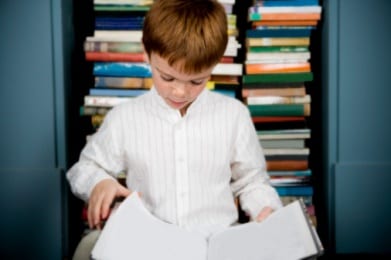The best predictor of reading success is the amount of time children spend reading both in
and out of the home. Having a variety of appropriate books at home in your own library makes
sharing books convenient, interesting and enjoyable for children of all ages.
It’s never too early to begin developing your home library. Even the youngest infants and
toddlers need books to promote literacy and language development. Home libraries do not
have to be expensive. It’s not about the quantity of books you have, but more importantly, it’s
about the quality and variety of books to which your child will have access.
Starting A Library
Choose books with words that are rhythmic to draw your child’s interest to the sounds
of the story.
Include books with interesting photos and illustrations.
Look for sturdy books that can withstand a young child’s constant handling and mouthing (board
books are ideal – all of the pages are heavy cardboard).
Include a few books that stimulate all the senses – touch and feel books, or books that make
sounds (these books typically don’t contain high-quality writing so only a few will do for your
permanent collection).
Avoid books that mimic popular television shows.
Look for reputable authors and illustrators. Many of their classic stories are available in board
book form.
Include at least one children’s cookbook with photos and a book of easy science experiences.
Books that promote action are books kids will want to read.
Include a poetry anthology with simple poems and colorful illustrations.
A Preschooler
Choose a variety of genres such as fiction, non-fiction, biography, poetry, etc. to give your child early experiences with many kinds of stories.
Include a couple of wordless books (these stimulate creativity and story-telling in children).
Provide more than one story by the same author and/or illustrator. (Children can learn to recognize the writer’s style or become familiar with a particular form of writing or illustrating.) Look for classic stories in their original editions.
When your child is ready to choose his or her own books, or needs just a little assistance from you, keep adding to your library. It might be time to weed out some of the younger-oriented books and replace them with picture and chapter books.
Elementary School
Choose books about topics that interest your child. (It is in our nature to choose books for our children that we enjoyed as children, or to choose subjects that we enjoy as adults. Try to choose books that reflect your child’s interests, even at the stage where you are still reading to your child. In this manner, you will help your child see that reading is an adventure into his or her own imagination.)
Look for books with characters to whom your child can identify. Look for characters with similar interests as your child or similar social situations. Include non-fiction titles. (Biographies can inspire young readers to learn more about the person or about the circumstances surrounding a person’s life. Real life adventures, nature studies and historical stories are often favorites.)
More Tips…
Consider books in a series to keep your child’s attention. (You may want to read aloud the first book in the series and then encourage your child to read the sequel(s).) Add reference materials such as an Atlas and a children’s dictionary. Choose books that are above your child’s reading level for read-aloud experiences. (Children are never too old to be read to. Reading aloud develops vocabulary and comprehension skills and encourages a greater love for reading.) Expose your child to a variety of genres to learn what interests him or her most – mystery, poetry, adventure, humor, historical fiction, biography, etc. Subscribe to a child’s magazine that may interest your child.
Establish it Now…
Your home library will evolve and change as your child grows. You’ll always have some favorites that you or your child keep in the library forever, and there will be other books that you can donate or sell to a used book store to make room for new ones. Most book stores and libraries have lots of information on classic stories, authors, and illustrators, as well as the best books for particular age ranges. Use those resources to start your home library today.
Establishing a quality home library may inspire your child to read and enjoy literature throughout his or her lifetime.
About the Author
Megan Riede is the Senior Director, Education Programs with Knowledge Universe, the parent company of KinderCare. Megan oversees the curriculum development for all of the education curriculum programs (core and enrichment programs) taught within KinderCare. Additionally, she supports the training of the bilingual teachers dedicated to Knowledge Universe’s Bilingual Mandarin Immersion Program and partners with Knowledge Universe’s Singapore business to develop the Mandarin Curriculum as needed for KinderCare. Before coming to Knowledge Universe, she spent 4 years as a Producer at Leapfrog in Emeryville, CA. developing interactive toys for children ages 3 to 6. Megan holds a BA in Elementary Education from the University of Arizona.





